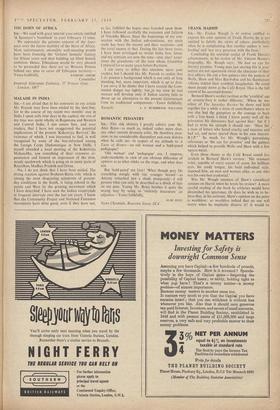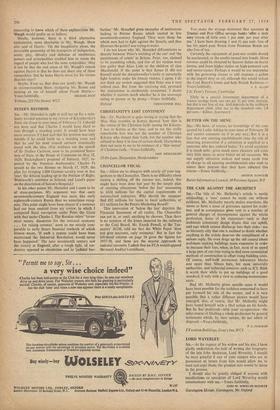FRANK HARRIS
SIR,—Mr. Evelyn Waugh is or course entitled to express his own opinion of Frank Harris; he is not entitled to falsify the views of others, particularly when he is complaining that another author is 'mis- leading' and 'not very generous with the facts' Concluding his scornful recital of Frank Harris's achievements, in his review of Mr. Vincent Brome's biography, Mr. Waugh says : 'He had an eye for . literary promise. Young men just starting life in jour- nalism are not squeamish about the character of their first editors. He put a few guineas into the pockets of Wells, Shaw and Max Beerbohm and his flamboyant villainy tickled their youthful imagination. He could shout people down at the Café Royal. That is the full extent of his accomplishment.'
Bernard Shaw's verdict (written at the 'youthful' age of seventy-five) is rather different : 'When he was editor of The Saturday Review he chose and held together for a while a team of contributors whom no one else had the gumption or the courage to back with a free hand. 1 think I know pretty well all the grievances his detractors had against him : but if I had to write his epitaph it should run: "Here lies a man of letters who hated cruelty and injustice and had art, and never spared them in his own interest. R.I.P." So much for M r. Waugh's patronising references to 'the eye for promise' and the guineas which helped to provide Wells and Shaw with a few square meals.
Even those shouts at the Café Royal sound less strident in Bernard Shaw's version : 'His resonant voice, capable of every accent of scorn, his brilliant eyes, his ready tongue, his bold individual style, imposed him, on men and women alike, as one who was his own best credential.'
Was Mr. Waugh unaware of Shaw's considered opinion on Harris when he wrote his review? A more careful reading of the book he criticises would have diminished his ignorance. Or does he wish us to be- lieve that, in his estimate, Shaw's opinion on the point is worthless: so worthless indeed that no one will worry when he implicitly distorts it? It would be interesting to know which of these explanations Mr. Waugh would prefer us to believe.
Maybe, however, there is a third alternative explanation, more charitable to Mr. Waugh. Shaw also said of Harris: 'On the imagitiative plane, the invariable generosity of his transports of indignation, scorn, pity, chivalry and defiance of snobberies; powers and principalities enabled him to retain the regard of people who had the same sympathies.' May it not be that the real cause of Mr. Waugh's venom against Harris is that he does not, share any of these sympathies; that he hates Harris more for his virtues than his vices?
Maybe. Even so, that does not justify Mr. Waugh in misrepresenting Shaw, maligning Mr. Brome and making an ass of himself about Frank Harris.—
Yours faithfully, MICHAEL FOOT



































 Previous page
Previous page